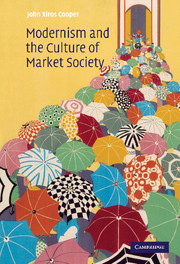Book contents
- Frontmatter
- Contents
- Acknowledgements
- Introduction The modernist avant-garde and the culture of market society
- PART I THE POSTHUMAN SCENE
- PART II THE REGIME OF UNREST: FOUR PRECURSORS
- PART III THE MARGIN IS THE MAINSTREAM
- 9 Artisanal production, Ulysses, and the circulation of goods
- 10 History and the postpsychological self in The Waste Land
- 11 La bohème: Lewis, Stein, Barnes
- 12 Bloomsbury nation
- Notes
- Bibliography
- Index
10 - History and the postpsychological self in The Waste Land
Published online by Cambridge University Press: 22 September 2009
- Frontmatter
- Contents
- Acknowledgements
- Introduction The modernist avant-garde and the culture of market society
- PART I THE POSTHUMAN SCENE
- PART II THE REGIME OF UNREST: FOUR PRECURSORS
- PART III THE MARGIN IS THE MAINSTREAM
- 9 Artisanal production, Ulysses, and the circulation of goods
- 10 History and the postpsychological self in The Waste Land
- 11 La bohème: Lewis, Stein, Barnes
- 12 Bloomsbury nation
- Notes
- Bibliography
- Index
Summary
In delineating the culture of market society in a previous chapter, I proposed that the market-form projects a distinctive sense of reality and, with it, certain clear epistemological standards, strategies, and forms of knowing that are intrinsic to it. These new protocols of knowing suffuse the whole social and mental order where that order has shed much of its traditional, precapitalist moral and political constraints. One aspect of the market-form's uniqueness lies in the character of its time-sense or the individual and collective experience of temporality. As in the concept of relativity in physics, market society weakens the concept of a singular, collective historical time. Public time exists, but only by segmenting the day strictly into work-time, leisure-or consumption-time, by the opening and closing bells of various activities, like the school-day or the operations of a bourse. Temporal segmentation lays over the lived experience of duration an abstract time-scheme that regulates the form and content of daily routines. Premodern forms of time-reckoning were tied more intimately to natural, environmental processes, like the rising and setting of the sun, the changing of the seasons, and the like. These natural processes persist, but today they have slipped into the domain of rhetoric as powerfully nostalgic metaphors.
Other experiences of communal time have also withered away altogether or run aground within religious sects or in the varieties of fundamentalism we find lodged awkwardly in modern societies.
- Type
- Chapter
- Information
- Modernism and the Culture of Market Society , pp. 194 - 214Publisher: Cambridge University PressPrint publication year: 2004



